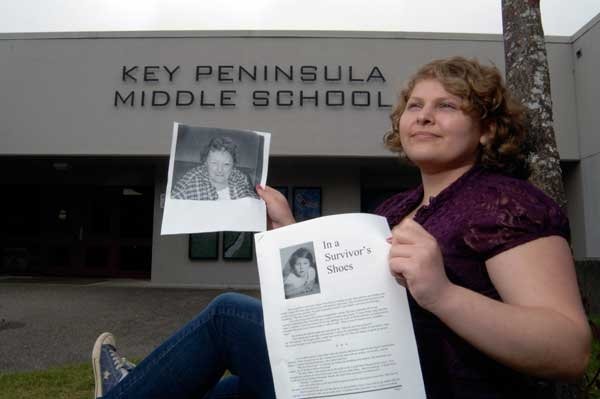 Sierra Rose Nason, 14, interviewed her great-grandmother about escaping Germany during the Holocaust. She and fellow KPMS student, Kassidy Crown entered a contest sponsored by Washington State Holocaust Education Center in Seattle. Photo by Scott Turner, KP News
Sierra Rose Nason, 14, interviewed her great-grandmother about escaping Germany during the Holocaust. She and fellow KPMS student, Kassidy Crown entered a contest sponsored by Washington State Holocaust Education Center in Seattle. Photo by Scott Turner, KP News
What began as a reading assignment for language arts students at Key Peninsula Middle School has become a pair of entries in a statewide contest to remember the Holocaust.
Earlier this spring, KMPS eighth-graders were given an assignment to read and discuss a book about the Holocaust as part of the school’s SpringBoard curriculum.
According to language arts teacher Vicky Schauer, studying the Holocaust has been part of the Springboard curriculum for three years.
“All three of my classes were assigned to read a book and then join in a discussion,” Schauer said. “But after the book discussions, several of the kids wanted to write about the characters or the authors of the books they’d read. It was a chance to extend the learning and personalize it.”
This year, Schauer was able to coordinate the school’s Holocaust study with the National Day of Remembrance and also with a statewide contest sponsored by the Washington State Holocaust Education Center in Seattle.
More than 700 students from across the state entered the contest with photographs, digital images and written works. Two KPMS students were chosen as finalists.
One student, Kassidy Crown, wrote “a lovely, amazing poem” about the Holocaust that is in the running for a prize, Schauer said.
For Sierra Rose Nason, 14, the reading assignment became an opportunity to tell the story of her great-grandmother, whose family escaped from Czechoslovakia just as Hitler’s armies invaded their country.
“I’ve always been interested in the Holocaust,” Nason said. “Not just the stories about the gas chambers and the concentration camps, but also about the escapees and the people who were able to get out fast enough. You don’t really hear much about them.”
Nason’s great-grandmother and her family were among the lucky ones who were able to escape.
“When we started the Holocaust section in SpringBoard, I knew I wanted to write about something,” Nason said. “And then when Ms. Schauer showed me the contest form, I knew I wanted to write about my grandma.
“She didn’t exactly experience the Holocaust because she got out fast enough to not have to survive through all the –– uh –– disappointments, but I knew I wanted to interview her,” she said.
Her great-grandmother’s old name was Hana Löyw, Nason said. “But now her new name is Joan Brant. I call her Grandma Joan even though she’s my great-grandmother. She was born on April 21, 1930 in Czechoslovakia. Now she lives in Spanaway with my aunt.”
For her story, Nason and her grandmother talked for about two hours. The young Nason said her hand was cramped from taking notes. At times, she said the interview became very emotional.
“When grandma was 8, that’s when Czechoslovakia got hit by Hitler’s power and that’s when her family left because they knew they weren’t going to be safe there,” she said.
Nason said one of her great-grandmother’s most frightening memories was about leaving Czechoslovakia.
“She remembers seeing the boots of a German soldier and she thought she was going to die. They kept changing the (colors of the) passes, which was how they kept the Jews confused. My grandmother was so afraid because she didn’t have the right color pass. But the soldier tripped and let their papers fly, and then he said they could pass,” Nason said with a smile.
Nason said the family made their way through Prague first, and then the underground helped them get to Holland, and when they arrived in America her great-grandmother was 13.
“I was very amazed by her story,” Nason said. “It’s so interesting and it’s astonishing that she can remember it all.
“What inspires me the most is those thousands of people who got killed. They didn’t just care about themselves, everybody cared about the other people. I don’t want anyone to ever forget that something tragic happened. I don’t want anyone to forget about the Holocaust,” she said.
UNDERWRITTEN BY THE FUND FOR NONPROFIT NEWS (NEWSMATCH) AT THE MIAMI FOUNDATION, THE ANGEL GUILD, ADVERTISERS, DONORS AND PEOPLE WHO SUPPORT INDEPENDENT, NONPROFIT LOCAL NEWS